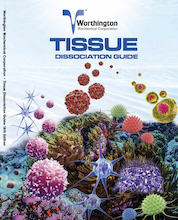For our international customers, please be advised that orders cannot be placed through our website by customers in countries with International Distributor representation.
Worthington Tissue Dissociation Guide
Optimization Techniques: Measure of Viability
One of the simplest methods to approximate cell viability is the dye exclusion technique. This method utilizes an indicator dye to demonstrate cell membrane damage. Cells which absorb the dye become stained and are considered non-viable. Dyes such as trypan blue, erythrosin, and nigrosin are commonly used with trypan blue being the most common in preliminary cell isolation procedures.
This procedure can be performed along with the cell counting procedure but cell density may require adjustment in order to obtain approximately 106 cells per milliliter.
Procedure- Mix 1 drop of trypan blue with one drop of the cell suspension and allow 1 - 2 minutes for absorption
- Prepare hemocytometer and load chambers as described in "Cell Quantitation".
- Count both the total number of cells and the number of stained (dark) cells.
Calculation
| Percent Viability = | ||
| Total Cells Counted - Stained Cells | x 100 | |
| Total Cells Counted | ||
Example
- Total Cells / 1 mm2 = 182
- Stained Cells = 24
| % Viability = | 182 - 24 | = | 158 | x 100 |
| 182 | 182 | |||
| = | 86.8% Viability | |||
Note: Dye exclusion viability procedures tend to give high estimates of cell viability when compared to cell attachment or metabolic assays, but for optimization of cell isolation procedures trypan blue does provide a rapid estimate of dissociation performance in conjunction with yield quantitation.
Tissue Tables
The Worthington Tissue Tables provide references useful to researchers interested in tissue dissociation and cell harvesting procedures. The references are organized by Tissue and Species type and linked to PubMed citations. The Cell type, Enzymes, and Medium for each reference is provided.
To search by specific criteria, use the Tissue References Search Tool.
